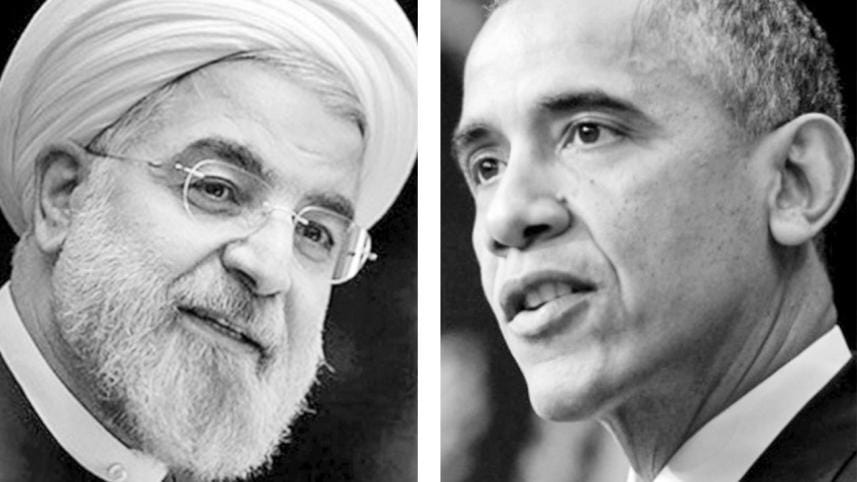Can Obama sell the nuclear deal with Iran?

THE clock is ticking in Lausanne in Switzerland where the foreign ministers of the United States of America and five other countries have been meeting their counterpart from Iran. By March 30, Iran must come to terms with the six countries brokering a deal to limit its nuclear fuel enrichment programmes and bring it under the safeguards of the International Atomic Energy Agency (IAEA) to ensure that no nuclear material is diverted for making the atom bomb. In exchange, Iran wants all sanctions imposed against it to be lifted permanently. The six countries agree only to suspend sanctions initially so that they can be re-imposed if Iran violates the terms of the deal.
If the deadline is missed, Iran will continue to suffer from sanctions initially imposed by the United States following the Iranian Revolution in 1979. In 2006, the UN Security Council passed a resolution imposing further sanctions after Iran refused to suspend its uranium enrichment programme. The sanctions covered exports of petroleum products and business dealings including banking and insurance transactions and shipping. Over the years, sanctions have crippled Iran's economy. Iran is now desperate to get rid of the sanctions. It badly needs the petro dollar and foreign investments to rejuvenate its economy. Iran insists that its nuclear programme is peaceful and will be happy to continue with enrichment in a limited scale under the terms of the deal.
Natural uranium contains several isotopes of which only uranium-235 undergoes fission and is used in nuclear power reactors to produce electricity and also in making the atom bomb. The concentration of uranium-235 in natural uranium is only 0.71% by weight. It needs to be increased to 3-5% for use in most present day nuclear power reactors and to a much higher level, around 80%, to make the bomb. The process of increasing the concentration of uranium-235 is known as enrichment. Gas centrifuge method is now widely used for enriching uranium. In a centrifuge plant, uranium in the form of a gas (uranium hexafluoride) is passed through a large number of cylinders rotating at very high speeds and arranged in cascades. The higher the number of cascades, the higher will be the enrichment that can be reached. The deal under negotiation will restrict the number of cascades in the centrifuge plants so that the enrichment of uranium cannot exceed a certain level (~5%) and bring all the centrifuge plants under the surveillance of the IAEA, the international watch-dog to prevent nuclear proliferation.
Even though all previous negotiations failed, it appears that a deal is at the final stage in Lausanne. US President Barack Obama told the Iranian people that a deal to transform the relationship between the two countries could be within reach. As the deadline is approaching, questions are being asked how far he will be able to sell it at home and abroad. Republican senators are already skeptical of any provision in the deal that allows the continuation of Iran's enrichment programme. They believe that Iran will secretly use the enrichment technology to build the atom bomb. Earlier this month, forty seven Republican senators warned that any deal on Tehran's nuclear programme could be revoked once Obama leaves office. Externally, Israel, the United States' closest ally in the Middle East, has been opposing any deal with Iran. In a recent speech to the US Congress, Israel's Prime Minister Netanyahu depicted Iran as a "threat to the entire world".
It may be mentioned here that Israel is the only country in the Middle East which is believed to be in possession of a nuclear arsenal. Officially, it neither denies nor confirms the possession of nuclear weapons. Its western allies also remain mysteriously silent on this matter. Now Saudi Arabia expressed its opposition to any deal with Iran that allows continuation of its enrichment programme. A senior member of the Saudi royal family has warned that a deal on Iran's nuclear programme could prompt other regional states to develop atomic fuel. He told the BBC that Saudi Arabia would then seek the same right, as would other nations. The Saudi claim may add a new dimension to the deal under negotiations in Lausanne.
This brings us to the crux of the problem: the secret possession of a nuclear arsenal by Israel which did not sign the Non-Proliferation Treaty (NPT). While sanctions were imposed against all other countries which had detonated nuclear devices, no sanction was ever imposed against Israel and no inspector of the IAEA visited Israel to inspect its nuclear weapons programme. So long as Israel continues to possess nuclear weapons, the danger of rivalry over possession of nuclear weapons cannot be ruled out in the region. It is, therefore, important that a uniform standard against proliferation of nuclear weapons should be applied in the region without any preferential treatment. This will be the only way to create a nuclear weapon free zone in the volatile Middle East.
The writer is a retired nuclear engineer.




 For all latest news, follow The Daily Star's Google News channel.
For all latest news, follow The Daily Star's Google News channel.
Comments